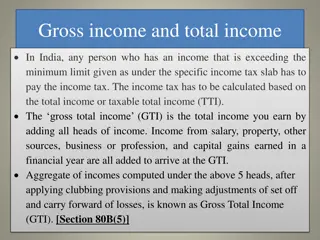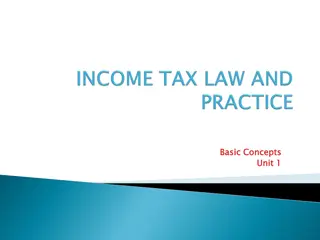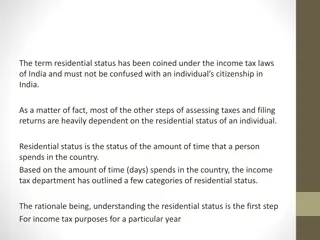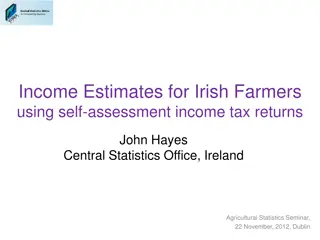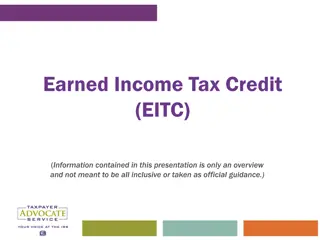Understanding Residential Status for Income Tax Purposes
Tax is levied on the total income of an individual based on their residential status as per the Income-tax Act, 1961. The Act classifies assessable persons into Ordinary Resident, Resident but not Ordinarily Resident, and Non-Resident. Residential status is determined by the physical presence of an individual in a country and is not related to nationality. Different criteria apply to Ordinary Resident and Non-Ordinary Resident status, impacting tax liabilities. It is essential to understand these distinctions for accurate tax assessments.
Download Presentation

Please find below an Image/Link to download the presentation.
The content on the website is provided AS IS for your information and personal use only. It may not be sold, licensed, or shared on other websites without obtaining consent from the author. Download presentation by click this link. If you encounter any issues during the download, it is possible that the publisher has removed the file from their server.
E N D
Presentation Transcript
BASIS OF CHARGE BASIS OF CHARGE OR OR RESIDENTIAL STATUS RESIDENTIAL STATUS
Tax is levied on total income of assessee. Under the provisions of Income-tax Act, 1961 the total income of each person is based upon his residential status. Section 6 of the Act divides the assessable persons into three categories : (i) Ordinary Resident; (ii) Resident but Not Ordinarily Resident; and (iii) Non-Resident. INTRODUCTION
Residential status is a term coined under Income Tax Act and has nothing to do with nationality or domicile of a person. An Indian, who is a citizen of India can be non-resident for Income-tax purposes, whereas an American who is a citizen of America can be resident of India for Income-tax purposes. Residential status of a person depends upon the territorial connections of the person with this country, i.e., for how many days he has physically stayed in India. MEANING OF RESIDENTIAL STATUS
Residential Status in a previous year. IMPORTANT POINTS TO BE NOTED Duty of Assessee. Dual Residential Status is possible. Same Residential Status for all sources of income.
ORDINARY RESIDENT ORDINARY RESIDENT = satisfying any one of conditions given u/s 6(1) + satisfying both the additional conditions of sec 6(6)(a)&(b) At a glance NON-ORDINARY RESIDENT NON-ORDINARY RESIDENT = conditions given u/s 6(1) + not satisfying any one or both the additional conditions of sec 6(6)(a)&(b) satisfying any one of
PERSON BASIS FOR RESIDENTIAL STATUS INDIVIDUAL Stay in India HUF Control and management of affairs + stay of karta in India Control and management of affairs FIRM Basis of COMPANY Place of effective management + place of Incorporation Control and management of affairs determination of residential status AOP/BOI LOCAL AUTHORITY Control and management of affairs OTHER PERSONS Control and management of affairs




